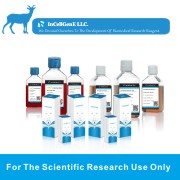

Overview
| Organism | Homo sapiens, human |
|---|---|
| Tissue | prostate; derived from metastatic site: bone |
| Product Format | frozen |
| Morphology | epithelial |
| Culture Properties | adherent |
| Biosafety Level |
1
Biosafety classification is based on U.S. Public Health Service Guidelines, it is the responsibility of the customer to ensure that their facilities comply with biosafety regulations for their own country. |
| Disease | adenocarcinoma |
| Age | 63 years old adult |
| Gender | male |
| Ethnicity | Black |
| Applications |
Cells from this cell line produce tumors in nude mice when injected either subcutaneously or orthotopically (intraprostatic).
This cell line is suitable for studying cell growth regulation by androgens.
|
| Storage Conditions | liquid nitrogen vapor phase |
Properties
| Derivation |
MDA PCa 2b was established from a bone metastasis of 63 year old Black male with androgen-independent adenocarcinoma of the prostate.
|
|---|---|
| Clinical Data |
male
63 years old adult
Black
|
| Antigen Expression |
prostate specific antigen (PSA)
|
| Receptor Expression |
androgen receptor, expressed
|
| Tumorigenic | Yes |
| Effects |
Yes, forms tumors in nude mice
|
| Comments |
The cell line expresses prostate specific antigen (PSA) and androgen receptor, grows in vitro and in vivo, and is androgen sensitive.
|
Background
| Complete Growth Medium |
The base medium for this cell line is F-12K Medium (ATCC 30-2004). To make the complete growth medium, add the following components to the base medium:
|
|---|---|
| Subculturing |
Volumes used in this protocol are for 75 cm2 flask; proportionally reduce or increase amount of dissociation medium for culture vessels of other sizes.
Subculture Ratio: 1:2 to 1:4
Medium Renewal: Every 2 to 3 days.
Note: For more information on enzymatic dissociation and subculturing of cell lines consult Chapter 10 in Culture of Animal Cells, a manual of Basic Technique by R. Ian Freshney, 3rd edition, published by Alan R. Liss, N.Y., 1994.
|
| Cryopreservation |
Freeze medium: Complete growth medium supplemented with 5% (v/v) DMSO
Storage temperature: liquid nitrogen vapor phase
|
| Culture Conditions |
Temperature: 37��C
Atmosphere: air, 95%; carbon dioxide (CO2), 5%
|


